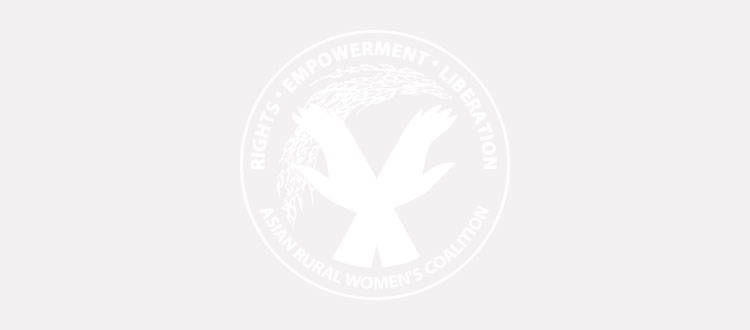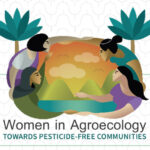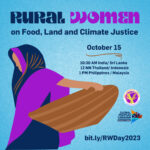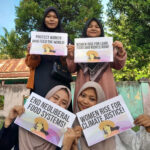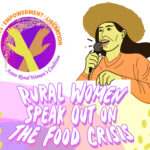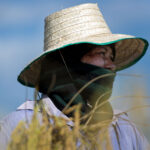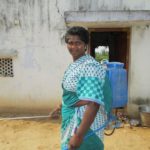Asia-Pacific Women’s Groups Holds Consultation with the Special Rapporteur on VAW in Manila
Representatives of women’s organizations and NGOs in the Asia-Pacific region met with Dr. Yakin Erturk, UN Special Rapporteur on Violence Against Women (VAW) on 12-13 September 2007 in Manila to dicuss about the political economy of VAW in the Asia-Pacific as a concrete input for the Special Rapporteur’s report for 2008. The participants to the Asia-Pacific regional consultation shared their experiences and analysis on the political economy of VAW in the fields of neoliberal policies, militarism and fundamentalism.
A national consultation followed on 14 September where women’s organizations and NGOs in the Philippines presented their key issues of VAW on the same field of neoliberal policies, militarism and fundamentalism. Innabuyog, through Vernie Yocogan-Diano and Julie Palaganas attended both consultations where case presentations on the particular violence against indigenous women in the Cordillera which is also shared by most indigeneous women in the Philippines and Asia. This is the violation of land rights by the state and corporations which is compounded by militarization in indigenous territories and state repression. The violence experienced by lesbians as a result of prevailing feudal-patriarchal attitudes and homophobic tendencies was presented by Julie Palaganas.
In both consultations as well, Amihan, national federation of peasant women shared the political economy of violence against peasant women resulting from agricultural liberalization and commercialization policies pointing out the experience of peasant women affected by corporate plantations in Mindanao.
Complimenting the presentations of Innabuyog and Amihan were experiences of Dalit women in India and from experiences of rural women from Bangladesh, India, Nepal, Sri Lanka, Korea, Indonesia, Fiji, Mongolia, Malaysia and Kazakstan where destruction of women’s livelihood has brought about various forms of violence. The violence includes poverty and hunger, enforced migration, human rights violations,illiteracy and inaccessibility to basic social services, vulnerability to fundamentalism and disasters, powerlessness and loss of dignity. Domestic violence has become more visible with livelihood being denied and becoming more inaccessible to women and their families. These are rooted in the enforcement of neoliberal policies to commercialize and intensify the commodification of land, food and natural resources upon the dictates of World Bank-International Monitary Fund and the World Trade Organization. According to the participants, states and corporations are working together to lead the global economy that favors more the ruling elite, their structures and corporations.
Madhu Mehra of the Partners for Law in Development in India and equally a member of the Regional Council of the Asia Pacific Forum on Women, Law and Development (APWLD) explained that the theme of the Special Rapporteur’s report for next year will be on the political economy of VAW. The theme will put substance on how existing human rights instruments on Civil and Political Rights and the Economic, Cultural and Social Rights have protected women and how have these been realized given the concrete conditions that women in the Asia-Pacific region are in these days. According to Madhu, political economy is an important tool of analysis on VAW as it also provides a roadmap to action. The latter however does not only limit women’s actions to the legal arena as more importantly the greater action of women had always been comprehensive requiring value transformation and transformation of insitutions.
Nida Legaspi of Begnas, local chapter of Innabuyog in Itogon made a testimony in the national consultation where she clearly presented the impact of corporate mining to women and children. These she said were comprehensible violence against indigenous women as destruction of their main source of livelihood puts women in a disempowered position as they lose their status of leadership and important role in production. Traditionally, the insights of indigenous women in Itogon have always been important to deliberations on community issues.
Emily Cahilog of GABRIELA presented in the national consultation the violence resulting from state repression and extrajudical killings of leaders, members and supporters of progressive people’s and women’s organizations in the country. GABRIELA underscored President Arroyo as primary violator of the rights of Filipino women.
Dr. Erturk admitted that the UN had been ineffective in responding to the world’s problems. She pointed out the erosion of state sovereignty because of globalization where rights of people and women are being violated. She suggested building a new social contract where women can collectively input on how the state should be pushed further to be responsible and accountable.
Dr. Erturk believes that the women have made great steps forward despite the big hindrances made by inter-state and state powers to get back the gains. According to her, the economic powers and the world cannot simply ignore the fact that women’s issues have now become public issues while noting that much have yet to be done. She further noted that the creation of the Special Rapporteur on VAW is a product of women’s struggles. Another gain is that women have found the links and interlinkages of their issues and of their movements as well from the North and the South. According to her, this is an ownership that women can truly claim being a clear product of women’s struggles. Women’s movements have also transformed the conventional human rights, asserted on state responsibilities and is transforming the criminal justice system by criminalizing acts of VAW, rape and others.
The words of Dr. Erturk was an inspiration to both regional and national consultations. A professor in Social Science, she served as Special Rapporteur on VAW for two terms and her term ends in 2009.
The two-level consultations were organized by the Asia-Pacific Forum on Women, Law and Development (APWLD) particular its Task Force on VAW and hosted by the Women’s Legal Bureau (WLB), a national women’s NGO in the Philippines. A national steering committee for the national consultation was led by the WLB, Amihan and other women’s organizations. Lynssay Francis, regional coordinator of APWLD says that the consultation was a productive effort not only in substance but also in bringing various women’s groups of different political persuasions and perspectives to talk about the political economy of VAW.###
Reference: Vernie Yocogan-Diano
Acting chairperson, Innabuyog

